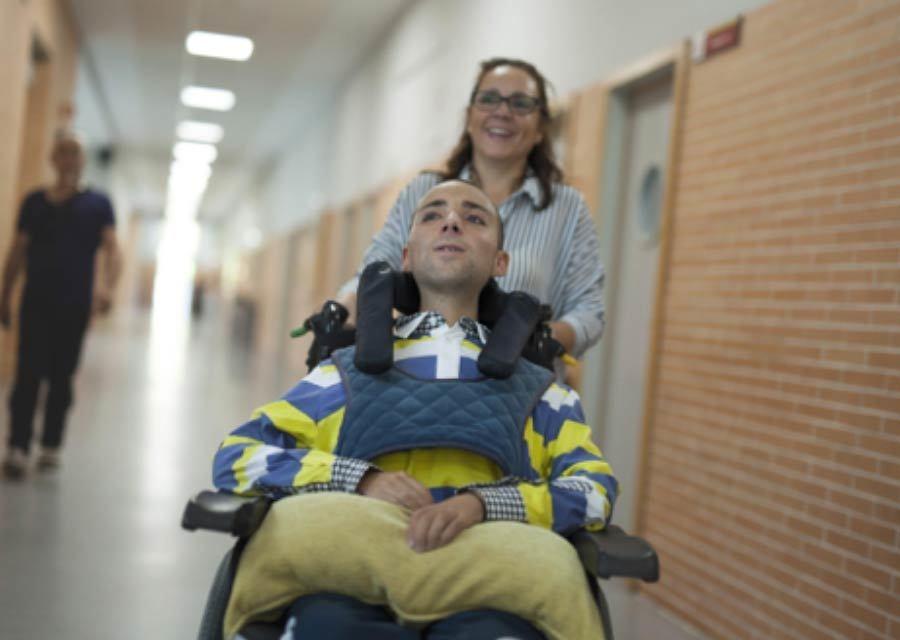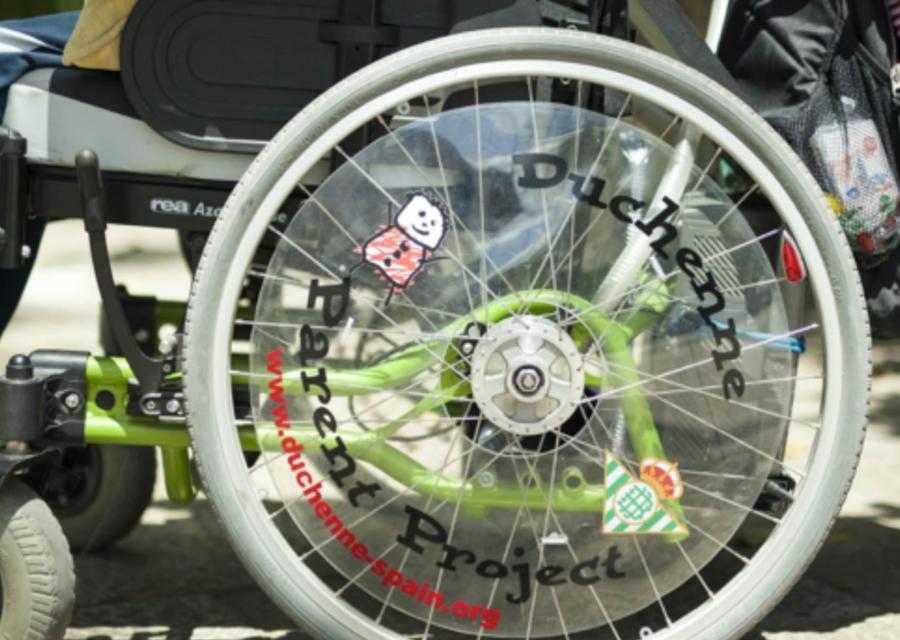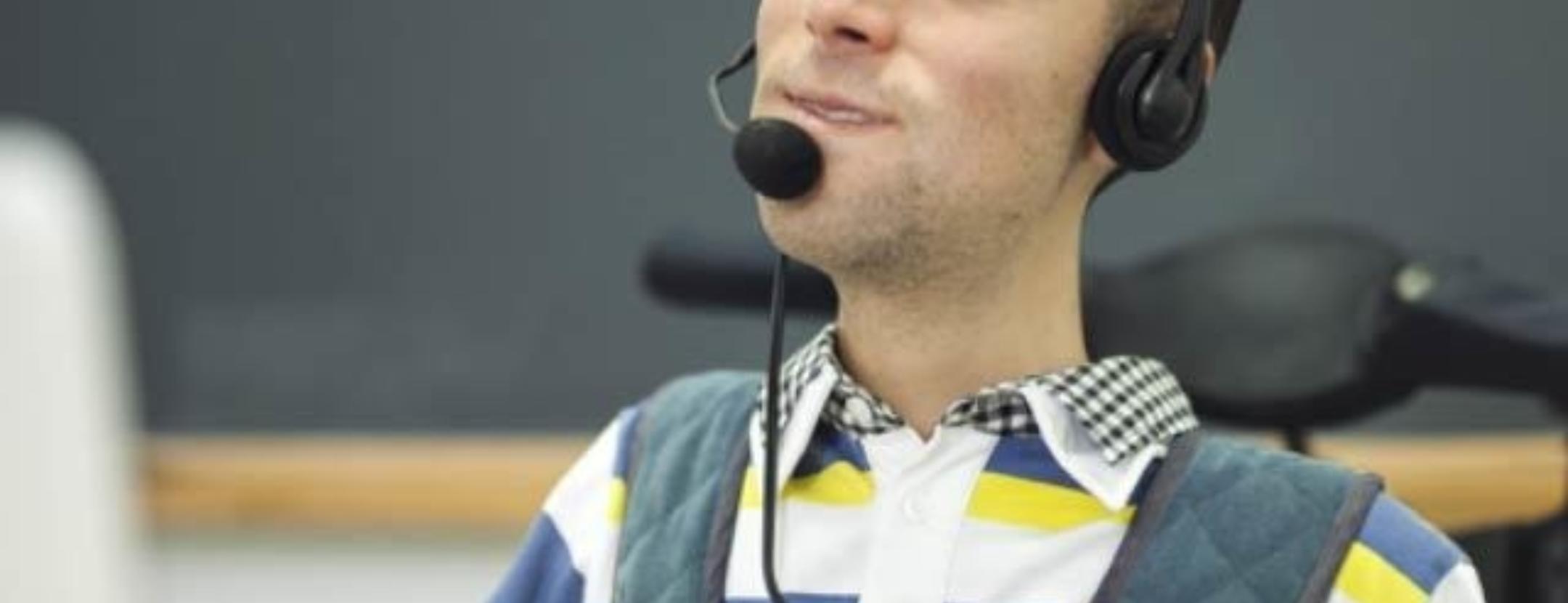“I started to write because of the discrimination I felt,” says Rafael, who goes by Rafa and speaks with a gentle timbre. “Even the people in my class would not approach me, maybe from fear or lack of knowledge.” Social isolation was the daily reality during Rafa’s first two years at the University of Seville in southern Spain. “I could see how other students would hang out, but no one would ever talk to me and I was too shy to do anything about it.” Rafa worried the distance he experienced between him and the rest of the world would grow if he did not act. “I gained confidence, and then I decided to take the lead,” he says. “Now I talk to people and they talk back to me.”
Breaching this threshold was a radical act for Rafa, and one that transformed him as a young adult living with Duchenne Muscular Dystrophy (DMD). Letting go of the importance placed on other people’s judgements helped him to become more self-assured. “I'm more confident now,” says Rafa. “I don’t care what people think about me.” His voice became a platform for him to tell his story—as a young man who had his life forever transformed by a degenerative condition. Rafa lost the ability to walk at the age of eight and since then has used a wheelchair. From that perspective he informs his more able-bodied peers. “I want people to know that we’re not different,” says Rafa. “I mean we are different in certain ways, but we are also the same.”
“I write so everyone can see us for who we are—as people with rights that deserve to be fulfilled.”


Rafa's budding poise in social situations transferred to his writing style, where he is not afraid to strike an affirmative tone to speak up on behalf of himself and his community. His interest in blogging began with a class assignment, soon took on it's own momentum. “Three years ago—for a writing class—I was asked to create a blog and I decided to make it about Duchenne,” he says. “That raised my own awareness about my condition.” Blogging has given Rafa a wider audience to communicate his thoughts and ideas. Through sharing personal anecdotes, creative allegories, and topical essays, he advocates for equal rights and treatment for the functionally diverse in Spain and the world over.
The term “functional diversity” in itself has been a huge inspiration to Rafa. It is a term currently utilized by activists to replace the more pejorative, “disabled.” Rafa views functional diversity as a weapon in the fight against inequality and supports proliferating its use. This has become the backbone of Rafa’s political aspirations and has further aided Rafa in recognizing his self-worth. “[It] has made me feel even more proud of being different, of seeing that despite my limitations I have many capacities.”
Rafa became motivated to fight for change thanks in large part to his collaboration with the Andalusian branch of Vida Indepediente, a national advocacy group that organizes for equal rights and access to care for the functionally diverse across Spain. Since working with the organization, he has used writing as a tool to expand the dialogue around ableism. “I write so that everyone can see us for who we are—as people with rights that deserve to be fulfilled.” His work with Vida Independiente has given him an opportunity to write for a cause. Rafa hopes to utilize his prose to further the goals of the organization and he sees many opportunities to remain socially and politically active on other fronts. “I would like to work for organizations that help people fight against many types of discrimination, like gender violence, drug addiction, and to help promote communication.”
Access to personal assistance is another major goal for Rafa and fuels his writing. “It is a fundamental right that the government should provide, but won't in Andalusia,” he says with frustration. Of the 17 autonomous regions in Spain, many provide some form of personalized assistance, but in the economically-disadvantaged south, this is not the case. He is currently fighting for personal assistance at the University of Seville. “This will help achieve greater autonomy and independence of university students with functional diversity,” says Rafa. He has also tried to open dialogue with local and national governmental agencies on the matter. “I've written different political parties, but nobody has answered yet. I'm trying every possible way.”
Without an assistant, it is his mother, Consuelo who helps with Rafa's daily tasks. “There isn't the proper support,” she says. “The university provides someone to assist him in the classroom, but only in the classroom. There's no one to help him go to the bathroom or to the cafe.” She wraps the harness for Rafa's ventilator around his head—two nasal plugs are inserted and Rafa does a breathing exercise. As the muscles around his lungs weakened over time, respiratory assistance became mandatory as it does for many men with DMD. Consuelo is a constant. Her diligence with Rafa’s daily needs—including the upkeep of some of Rafa's most basic bodily functions—is remarkable but necessary. Without her, he would not be able to attend university, of which he is on the verge of completing with a degree in Journalism.
Rafa is certainly not shy in expressing his appreciation. Consuelo is not just his mother, but his best friend. “We tell each other everything,” says Consuelo. “There are no secrets between us.” Casual conversation flows freely as they traverse the sprawling campus. They broach subjects about Rafa’s life as a college student, including things some might consider uncouth for mother-son conversations. “I have had relationships with girls and I tell my mom about it,” says Rafa. “We laugh about it.” She is both his advisor and confidant.
When inspiration hits, Consuelo is quick to get Rafa set up to scribe it all down. She pulls him up to the table and loosens his neck-rest which supports his head. She leans Rafa slightly forward so that his shoulders are supported by the pair of straps fastened to the back of his chair, opens his laptop, and carefully untangles the wires to Rafa's headset. Then, she takes out his adapted keyboard and places his right hand on the track-pad. All of Rafa's ruminations are about to spill out. He stares intensely at the screen. He uses a speech-recognition program, called Dragon, to transform the words from his lips into words on a page. “In the the past it was really hard for me to write,” he says. “But now I can write anytime I want. It’s fantastic.”
At the core of Rafa’s prose is his desire for acceptance—both internal and external. This has become his mantra. “Thanks to this disease, I'm the way I am,” he proclaims. His impetus to study came from acceptance of the adversity he would face in the job market, exalting the importance of higher education. “If it hadn't been for the disease I wouldn't have gone to this university. I would've been a different person. If I didn't have the disease, I probably would've created other problems for myself. Perhaps I'd be an alcoholic, and I would just drink and go to parties all the time.” Rafa hopes to inspire others living with functional diversity to accept and express themselves and is working to solve problems with ingenuity and an optimistic attitude on life. “Psychologically, I've always had my target pretty clear,” says Rafa. “I don't think about this disease constantly.”
Rafa’s writing: http://www.worldduchenneday.org/rafael-lugo-vizcaino/
Also of interest: http://elsueñoderafa.org/



